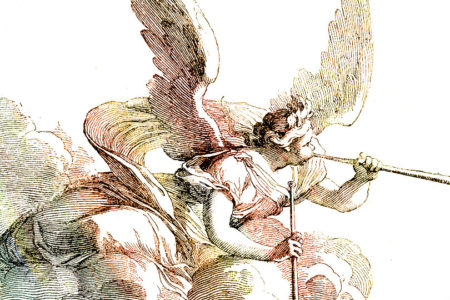Christmas Bedlam
For many of us, Christmas is far from the “silent night” and “peace on earth” we sing about. Copious community events, school concerts, and church programs fill the season. Fare at social and family gatherings rivals that of medieval banquets and expands our waistlines. Shopping and gift-giving expectations pressure us to spend more than we can afford. Heavy traffic crawls along the highways, and tempers flare as the holiday hustle and bustle crescendo into a frenzied pitch. Sometimes it feels like pure bedlam!
The word bedlam originated from the nickname for St. Mary’s of Bethlehem, a London priory founded in the mid-1200s to care for the poor and disabled. It eventually became England’s first mental institution. Over the years, colloquial language shortened the name to Bethlem, which mutated into Bedlam.
Bedlam’s sordid history involves brutal patient treatment involving cells, chains, shackles, beatings, and dietary rationing. It became a place of uncontrolled noise, chaos, and confusion—utter “bedlam.” By the mid-1600s, visitors were paying to observe the behavior of naked, chained patients who were often screaming, crying, cursing, ranting, or acting like animals. Some claim it was like a human zoo. Broken souls became London’s local entertainment.
The words quiet and peaceful do not come to mind when describing London’s Bedlam. Nor do they come to mind when pondering the village of Bethlehem on that first Christmas day. Chaos, confusion, and noise probably filled the air as King David’s travel-weary descendants poured into the city for the mandatory census. They arrived looking for places to stay, food to eat, and relatives to provide it all.
The long journey from Nazareth to Bethlehem no doubt was hard for Joseph and even more difficult for Mary, who was rapidly approaching her time to give birth. Upon their arrival, they had nowhere to stay in the crowded town and were brought to a stable filled with animals covered with the dust of journeys from afar. Potent smells filled the air asJoseph cleared a resting place in the straw.
Then the fullness of time came, and Mary gave birth, separated from all familiar comforts. She endured the sting of the sin curse—pain during childbirth—and brought forth her firstborn son.
Joy and wonder quickly overcame exhaustion and fear. The stable’s unpretentious accommodations provided little more than swaddling cloths, a chiseled-stone feeding trough, straw (for bedding), and perhaps a few blankets.
In the surrounding fields, without warning, the blackened night sky burst into brilliance with the glory of the Lord as angels unashamedly proclaimed the Good News. The spectacle terrified the shepherds. Their obvious fear required angelic reassurance: “Do not be afraid, for behold, I bring you good tidings of great joy which will be to all people. For there is born to you this day in the city of David a Savior, who is Christ the Lord” (Lk. 2:10–11).
Imagine the shepherds’ excitement. Good news? A Savior? Joy? Let’s leave the sheep and hurry to find the babe! they thought, “and see this thing that has come to pass, which the Lord has made known to us” (Lk. 2:15). They searched with haste until they found Mary, Joseph, and Baby Jesus, exactly as the angel had told them.
There was bedlam in Bethlehem that night. Mary and Joseph marveled, the shepherds quaked, the town awakened, and heaven and Earth changed for all eternity.
When Jesus was born in Bethlehem, bedlam also ruled in people’s hearts. They were lost and confused without a Messiah. The same may be said today. Chaos, confusion, and the disorder of bedlam often reign in the midst of the Christmas holiday. People who don’t know the Savior grasp forsomething or someone to bring hope and peace to chaotic lives and broken hearts.
Jesus came to bedlam. Chaos and confusion reigned in the world when Jesus arrived. The Jewish priest Zacharias declared that Jesus came “to give light to those who sit in darkness and the shadow of death, to guide our feet into the way of peace” (1:79). Jesus said He came “to seek and to save that which was lost” (19:10).
Jesus brought hope to bedlam. Jesus is the ultimate expression of God’s tender mercy to those without hope. He is the “Dayspring from on high” who came to bring us out of hopelessness and darkness (1:78).
Jesus brought comfort and joy to bedlam. He is the Consolation of Israel, the salvation from the Lord, and the answer for all who look for redemption (2:25–38).
My ‘Wow’ Moment
Throughout my years as a pastor, Christmas was often the most challenging time of the year. Juggling the feverish schedule of leading a church, ministering to the community, and raising a family exhausted me. But I always looked forward to our annual Christmas Eve candlelight service.
By the time the service began, the busyness of the Christmas season had ended. The stores were closed, the programs were behind us, and the food baskets and gifts were delivered to the needy. The service was simple and quiet. We sang traditional carols, followed by a Bible message.
I proclaimed the Good News from the pulpit with great joy and encouraged the congregants to consider their personal relationships with God. Then, as the darkened church began to glow with the lighting of individual candles, we filled the room with the melodious sounds of “Silent Night.”
For me, that’s when Christmas began. I could finally fix my heart and mind on Jesus, rather than on the myriad of ministry details. Like the shepherds, I experienced my “wow” moment then. The Savior’s presence soothed my frantic pace.
Seeing Christ changed the shepherds’ lives. Although we can’t travel back in time to join them at the manger, what they learned that first Christmas night can guide us from bedlam to peace and joy in Christ.
The Lord revealed to the shepherds that the Savior, Christ the Lord, was born (v. 11). They dropped everything and pursued this truth. Ask yourself, “What is the most important thing to me about Christmas?” If it is Christ, make enjoying Him your priority. Yes, enjoy the celebrations, but don’t squeeze Christ out. Make Him the center of them. Pursue Him. Determine to spend time with Him. Skip the less important things so you can celebrate the true meaning of Christmas—the Incarnation of Immanuel, “God with us.”
The shepherds told people about Christ. Scripture suggests they talked about Him to everyone, everywhere they went. Talk about Jesus with your family—around the table, at a party, at the store, etc. Make time to read the Scriptures about Him: His birth, death, burial, and resurrection. Remember who He is, what He has done, and what He is going to do for you.
When was the last time the truth that God loved you so much He gave His only begotten Son for you moved you? Christmas is about God’s indescribable gift of grace. It is about hope in the midst of despair. It is about a Savior who was born to die for you. Let that truth leave you in wonder this Christmas season, as it did the shepherds.
After all the shepherds had seen and heard, they stopped fearing and began praising and glorifying God (v. 20). If we allow the truth of Christmas to impact our hearts and lives, it will move us from fear to faith, as well, changing the way we face the future. When God becomes the main character in our lives, our priorities, conversations, and outlooks will change.
Let’s refocus this Christmas on the joy and peace found only in the Good News of the Messiah and Savior, Jesus Christ. The choice is ours: bedlam or blessing.








